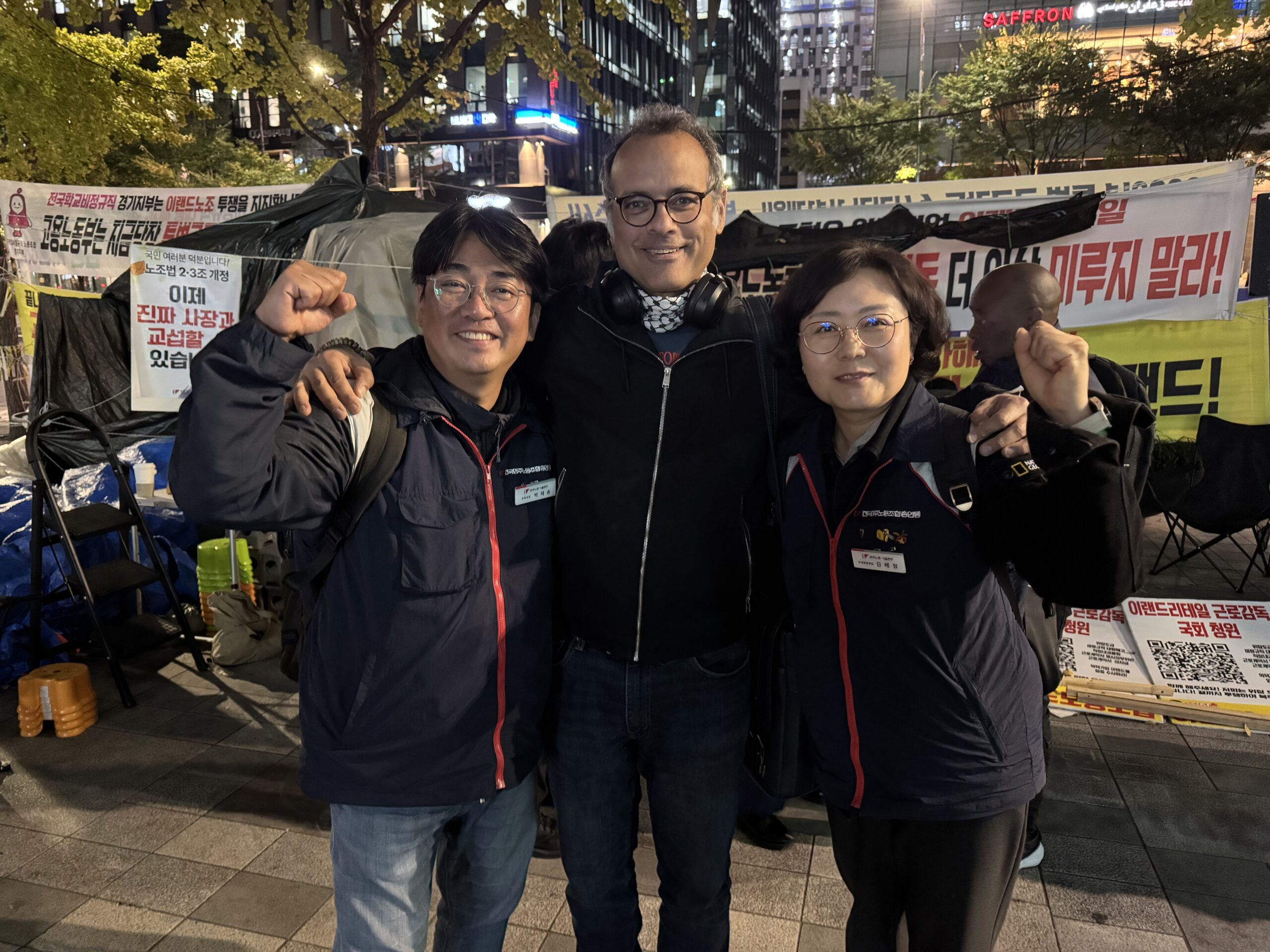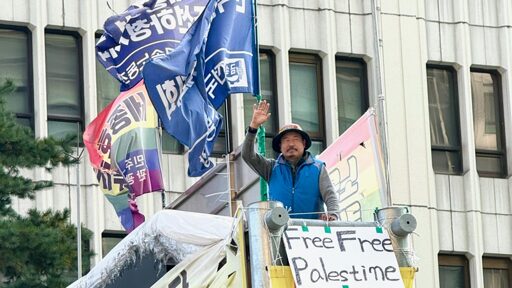Jinsoo Koh has been living on a rickety metal overpass that sits above Toegye-ro street in Seoul, across from the old Sejong Hotel. He had been up there illegally for 261 days when I met him. I didn’t go up, and nor did he come down. In either case, one of us would have been arrested. So, we spoke via megaphones, the traffic of the street drowning out our words.
Jinsoo worked in the Japanese restaurant of Sejong Hotel as a sashimi chef. During the COVID-19 pandemic, he and 259 workers of the hotel were collectively dismissed, some forced into early retirement. The hotel, whose proprietor also owns Sejong University and other properties, only retained 21 workers and hired subcontracting firms to run the rest of the functions of the hotel with casual workers. Jinsoo tells me that the hotel authorities say that the workers who have built a tent outside the hotel, hold pickets, and live in the overpass across from the hotel are disrupting the peace. “To disrupt the peace for the customers of the hotel,” he says! “But peace must be built on the happiness and security of the workers.”

Author with Park Jae-song (Korean Confederation of Trade Unions Seoul Branch Director of Organizing) and Kim Hye-jeong (Korean Confederation of Trade Unions Seoul Branch Senior Deputy Director. Photo: Vijay Prashad
Jinhee (age 55), one of the 6 workers who Sejong refuses to reinstate and who lives outside the hotel, says that she has worked for the hotel for years and that what was good in the hotel came from the labor of the workers. And now, in struggle, she feels the energy of her fellow workers and her trade union, the Korean Confederation of Trade Unions (KCTU). “I could not endure this struggle without the trade union. We could not have managed.” As their struggle developed from December 2021, the six workers and those who stood with them studied together and sharpened their own understanding of the system and the struggle. When former president Yoon Suk Yeol tried to establish martial law on December 3, 2024, the workers – including Jinhee – went to the Yongsan Presidential Office to defend the Constitution. She felt encouraged by the other citizens, her commitment to a new world strengthened.
Read More: To stop coups in South Korea, expand democracy
Not far away, outside the Seoul Labor and Welfare Center, workers dismissed by a major corporation, Eland, sit on plastic benches and talk about their fight. Jeong Juwon tells us that the owner made billions over the years, mouths Christian slogans, but does not care at all for the workers. The regular workers, who have been fired now better understand the capitalist system, Jeong Juwon and Son Myung. Bosses generally pit regular workers against irregular workers. But now, Jeong Juwon says, “irregular workers are our friends and family. They are our friends and family.”
“I’m an Israeli”

Free Palestine banner outside the Seoul Labor and Welfare Center. Photo: Vijay Prashad
When the leaders of the twenty-one countries came for the Asia-Pacific Economic Cooperation (APEC) meeting, their cars did not drive by either the Sejong Hotel or the Seoul Labor and Welfare Center. They did not get to see Jinsoo Koh with his “Free Palestine” banner or Jeong Juwon with his kufiyah. “We were colonized by the Japanese,” Jeong says. “So, we can understand the struggles of the Palestinians, colonized by the Israelis.”
A man stands next to me as I am listening to Jeong. Our conversation begins slowly:
Vijay: It’s a labor struggle.
Man (pointing at the Palestine flag): I see. I’m an Israeli.
Vijay: We are pro-Palestine.
Israeli: What can you do? The terrible killing of babies, cutting their heads off….
Vijay: That’s Israeli propaganda. You are a brainwashed Israeli.
Man: No, it’s not. It is the truth. They started it….
Vijay: No. You started it when you occupied the land in 1948.
Man: That is not true. You don’t know the……
Vijay: I know more than you.
Man (angered): No, you don’t. You are an outsider. I live there.
Vijay (puts his hand in front of the man): You are brainwashed.
The Israeli walks away, livid.
Why should I make it comfortable to be a Zionist on the streets of Seoul?
Our delegation, here in Korea as guests of the International Strategy Center and the International Peoples’ Assembly (IPA) for a counter-summit on APEC, is filled with people who are wearing the kuffiyeh and have no tolerance for this kind of genocidal thought. All the Koreans we meet in the trade union movement and in the social movements have a strong consciousness about Palestine. “From Palestine to Korea, US imperialism occupies, divides, and destroys,” says Dae-Han Song of the International Strategy Center to me. “Palestine’s liberation is our liberation.”
The mafia state of America

Picket in front of King Sejong. Photo: Vijay Prashad
Across from the US embassy in Seoul is a large statue of King Sejong, after whom the hotel is named. Sejong ruled the country from 1418 to 1450. He decided that Korean writing was dominated by the landed aristocracy (yangban) and inaccessible to the commoners. Therefore, he rejected the old characters and designed the Hangul, the sounds of each symbol – he felt – like the shape of your tongue when you made that sound. There are such interesting examples of historical democratization in our histories.
Read More: Trump met with popular protests in South Korea over tariff war and coercive policies
Right next to the statue, various Korean groups have organized a large picket against the Trump extortion, our eyes on the US embassy building whose 1970s façade looks cinematic in its shabbiness. A horde of European tourists walk past us to take a picture of Sejong, and – gingerly – to take a picture of us with our signs against Trump. A Korean man begins to yell. He objects to us holding the picket near Sejong’s statue. (Wonder if he worried about Sejong’s name being used by a hotel that treats its workers brutally?). Korean politics is strange, says a young student to me in apology. Politics around the world appears strange these days, I say to him, and we smile together. There is kinship in that recognition.

The author with a young Korean activist in front of the US embassy and King Sejong. Photo: Vijay Prashad
Sejong, meanwhile, was an extraordinary man – a believer in scientific experiment, the patron of scientists such as Chang Yongsil (the designer of the water clock in 1434) and Yi Chon (who, with Chang Yongsil, who developed the rain gauge or Chugugi, two centuries before it was invented in Europe by Benedetto Castelli). I doubt that Sejong would be proud of his country as it haemorrhaged its wealth to the mafia state of Trump. The man who defended Sejong might have some misguided ideas about nationalism, but what he certainly didn’t seem to possess is an idea that Sejong shares – the idea of sovereignty for a country. South Korea’s sovereignty was stolen by the United States when its troops landed to occupy the country after 1945.
Donald Trump arrived in South Korea an hour or so after our picket had begun. We caught the lunch time crowd at Gwanghwamun Plaza, an enormous open space flanked by a Starbucks near the US embassy and the grand theater. People drifted by with their coffees and bubble teas, men and women in office clothes as well as tourists with their cameras and guidebooks. Some of them stopped and read our signs, radical signs about Trump and his extortionist agenda. Not long afterward our warm picket had ended, Trump met South Korea’s new president Lee Jae Myung, not the worst of the country’s presidents. Trump came to South Korea just after the “No Kings” rallies in the United States. It was vulgar that President Lee decided to give Trump a golden crown as a gift, crowning him king against the will of the people in the United States.
And then, with the golden crown in his hand, Trump set down the terms of the deal. He would not bankrupt the South Korean chaebols, who rely upon the US market for some inputs and for sales, if South Korea invested in the United States. Lee put hundreds of billions of dollars on the table for just that purpose. It was extortion, a protection racket. For its US military umbrella over South Korea, Trump demanded payment, and he got it. President Lee gave the US 70% of Korea’s annual budget and 85% of its foreign reserves. That was the real outcome of the APEC summit. Forget the declaration, which is a sideshow. The main thing is that Trump essentially took the South Korean treasury back to the United States. Make America Great Again, Make South Korea Poorer. That’s the Trump slogan in Korean.
Read More: From tariffs to tribute: the $350B price of “parity”
From up on his overpass, Jinsoo Koh says into his megaphone, “We cannot pretend that the government that gives Trump a crown is anything other than one that is entrenched in the capitalist system.”
From the river to Gyeongju

Author with Lee Baek-yoon (leader of the Labour Party), Kim Chang-hwi (co-leader of the Green Party), Kwon Yeong-guk (leader of the Justice Party), and Lee Sang-hyun (co-leader of the Green Party). Photo: Vijay Prashad
We are marching in Gyeongju, a conservative city. The march is led by leaders from the broad left: the Justice Party, the Green Party, and the Labor Party, as well as from social movements (the trade unions and the International Strategy Center). We are moving through the streets. A shopkeeper begins an altercation with the marchers. It is a minor disturbance. She is bothered by the presence of the left in her city. At an intersection, there are a small group of people with flags that interest me, and at that point, Kwon Yeong-guk (leader of the Justice Party) leans over and says to me that they are from a fascist movement; Lee Baek-yoon of the Labor Party says that there is a strain of religious right-wing politics that has been growing. There is still support for the deposed president Yoon, and in that line, for the United States and for Israel.
We chant louder for Palestine. It seems to be a clear divide in the politics of the country. The chants for Palestine are in English. The Koreans, who otherwise speak no English, are fluent in these chants. They have been practiced over the past two years at the pickets held every other Saturday. Free, free Palestine, and From the River to the Sea.
Perhaps they are also thinking of Korea. One day, perhaps, it can be united, from the Yalu River to the South Sea. But, for today, such a chant would be illegal under the National Security Law of 1948.
The post A diary from the streets of South Korea appeared first on Peoples Dispatch.
From Peoples Dispatch via this RSS feed


